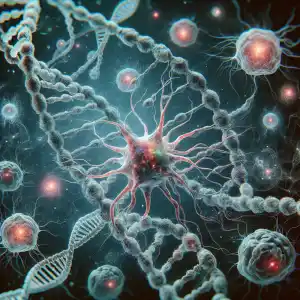Inflammation's Role in Multiple Sclerosis Progression


Inflammation Identified as a Potential Cause of Multiple Sclerosis Progression
For the first time, researchers have identified that inflammation—long associated with Multiple Sclerosis (MS)—may directly contribute to the progression of the disease by accelerating genetic mutations in neurons. This groundbreaking discovery opens new avenues for understanding MS and developing targeted treatments.
MS is a chronic neurological condition affecting over 33,000 Australians and three million people globally. Approximately one-third of MS patients experience progressive disease, for which current treatments are largely ineffective.
New Insights Into MS and Inflammation
A research team from The Florey and the University of Melbourne studied MS brain lesions—areas of past or ongoing inflammation visible on MRI scans. They discovered that neurons in these lesions accumulate mutations at a rate 2.5 times faster than normal neurons, providing strong evidence that inflammation accelerates genetic changes associated with MS progression.
Florey Associate Professor Justin Rubio, Head of The Florey’s Neurogenetics Group, led the study, which was published in Nature Neuroscience.
"Our research suggests that inflammation in the brain of people with MS causes mutations in neurons, potentially driving disease progression," Associate Professor Rubio explained.
Understanding the Genetic Impact of MS
The study focused on somatic mutations—genetic changes that occur in individual cells over time, rather than being inherited. Such mutations can disrupt normal cellular function and survival, leading to neurological decline.
By analyzing brain tissue from 10 individuals with MS and 16 without, researchers found that neurons in non-lesion areas and unaffected brains accumulated an average of 17.7 mutations per year. In contrast, neurons within MS lesions accumulated 43.9 mutations annually—leading to approximately 1,300 additional mutations by age 70.
"Not only did we observe an increased mutation rate in MS lesions, but we also found distinct mutation types that differ from those seen in normal aging," said Dr. Allan Motyer, bioinformatician and first author of the study.
Implications for Future MS Treatments
This discovery paves the way for further investigation into how these genetic mutations contribute to neuronal death and disease progression. Associate Professor Rubio and his team are now working to identify potential treatment targets to slow or prevent progressive MS.
University of Melbourne Honorary Professor and practicing neurologist Trevor Kilpatrick, a co-author on the study, highlighted its significance: "This research is the first to suggest that inflammation may lead to neuronal loss in MS through accelerated genetic mutations. If we can pinpoint the exact molecular disruptions responsible, we may develop treatments to preserve neurons and reduce disease progression."
While these findings do not yet constitute a treatment, they bring the medical community closer to identifying potential therapeutic strategies.
The research was made possible through the support of MS Australia and the generous contributions of families who donated brain tissue for scientific study. Additional collaborators included researchers from the University of Sydney, BGI-Australia, and The China National Gene Bank.
Pursue a Career in Medical Research with MyCourseFinder.com
Groundbreaking discoveries like this highlight the importance of medical research in transforming lives. If you're passionate about neuroscience, genetics, or medical science, MyCourseFinder.com can help you find the best programs worldwide. Our expert agents provide guidance on study options, visas, and migration matters to ensure you choose the right path for your future. Apply today with MyCourseFinder.com and take the first step toward a career in groundbreaking scientific research!










